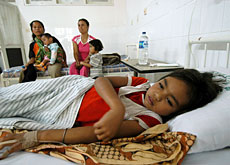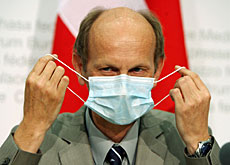Flu pandemic remains number one health threat

A human bird flu pandemic is still the biggest global health threat, according to a senior Swiss official speaking on the eve of the 60th World Health Assembly.
Bird flu may have not dominated the news agenda in recent months but it will top the bill at the ten-day session, which opens in Geneva on Monday.
“We still have an epidemic in birds, we still have regular transmission from birds to humans and that means the threat is still there,” Gaudenz Silberschmidt, head of international affairs at the Federal Health Office, told swissinfo.
“We still don’t know when there will be a mutation towards human-to-human transmission. [Pandemic] preparations have advanced but they still have to advance further in all countries.”
Two issues that are expected to be hotly debated during the session are access to virus samples and access to vaccines.
Indonesia, which has suffered the highest number of fatalities from bird flu, wants better access to vaccines in return for sharing samples.
At a WHO meeting at the end of last month it was agreed that the world body should examine the possibility of an international stockpile of a pre-pandemic vaccine to complement national efforts. This will be discussed during the assembly.
Switzerland is due to start taking delivery early this summer of eight million doses of a pre-pandemic vaccine – enough for the whole population – made by Anglo-American firm GlaxoSmithKline.
Fears over the spread of the deadly H5N1 virus have been a media staple over the past three years but no cases were reported in Europe during the winter migration season.
From February to March last year 32 dead wild birds were found with the H5N1 virus in Switzerland alone.
But while bird flu may have fallen off the public’s radar in Switzerland and other European countries, Silberschmidt insists the threat has not gone away.
Infected poultry
According to the WHO, 172 people have died after coming into contact with infected poultry since 2003. There have been fourteen fatalities so far this year, mostly in Asia.
“To some extent it’s helpful that the massive media attention has dropped off because then we can prepare quietly; on the other hand we need the public to take the threat seriously,” said Silberschmidt.
Delegates will also be addressing issues such as the application of the International Health Regulations, the destruction of smallpox virus stocks, malaria and tuberculosis control, plus the eradication of polio.
Taiwan’s bid to become a member of the WHO is also expected to stir passions. Taiwan has been trying, so far unsuccessfully, to join the World Health Assembly as an observer since 1997.
“Switzerland has a one China policy; if that were to change it would have to be in the UN and not in a specialised agency. We are not in favour of backdoor attempts to politicise a technical agency,” said Silberschmidt.
swissinfo, Adam Beaumont in Geneva
The World Health Assembly is the supreme decision-making body of the World Health Organization.
It meets in Geneva in May each year, and is attended by delegations from the 193 member States. The main function of the assembly is to determine the policies of the organisation.
This year, issues to be discussed include: polio eradication, tuberculosis, health systems and emergency-care systems, oral health, gender strategy, and avian and pandemic influenza.

In compliance with the JTI standards
More: SWI swissinfo.ch certified by the Journalism Trust Initiative












You can find an overview of ongoing debates with our journalists here . Please join us!
If you want to start a conversation about a topic raised in this article or want to report factual errors, email us at english@swissinfo.ch.